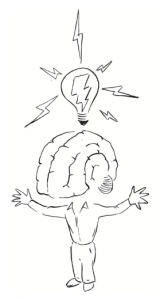I’ve just re-read the first few chapters of Steven Johnson’s “Where good ideas come from: The Natural History of Innovation” (you can watch the TED Talk or watch the RSA Animates video, but I highly recommend the slow read through the actual book) on the plane ride to Doha, and all week it’s been fascinating to watch the liquid network of minds at this event. Johnson defines this concept of a liquid network as “bringing together a diversely-focused group of creative people.” Normally, I have quite a few ideas on any given week, but in this network, the idea generation has been fast & furious (even for me!).
Johnson also says that “good ideas come from the collision of smaller hunches” and here at the TEDxSummit, with 650 participants from 90+ countries, my smaller hunches are colliding with a whole new set of smaller hunches, and in particular, a whole new set of problem spaces.
The conversations and critical thinking at this event is much like playing video game in my brain (imagine the Angry Birds of idea formation). With every conversation with a participant, a new “level” (problem space) presents itself. I throw a collection of well-designed missiles (ideas) at it. Sometimes it’s a direct and perfect hit. Sometimes it’s not quite right, the problem space shows me the flaws, and I go for another throw. Finding the solutions to problems is a lot like playing a video game. The constraints of a new system actually birth more creative solutions.
One of the TEDx organizers, Eiso Vaandrager, used the phrase “idea sex” to answer the question, “What is TEDx?” and I think that’s about right. And while the brainchildren of idea sex are brilliant and exciting, it’s important to remember and give credit to the parents of these ideas as well, and remember the stories of where and how those fires were sparked.
An idea is something powerful, and while an idea cannot be copyrighted or patented (only the form of an idea can be patented), it should be credited. Without this, the TEDx community (and the other liquid networks you are a part of) will grow wary of sharing openly, and that would be a shame. As we all go home and share the wonderful things we’ve learned, try to remember to give credit where credit is due. The intoxicating new ideas we now carry were not generated in situ.






